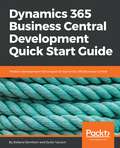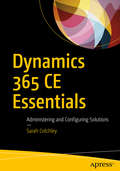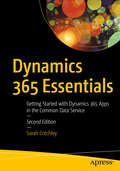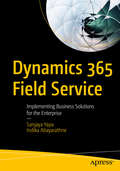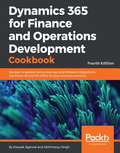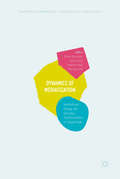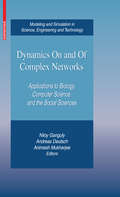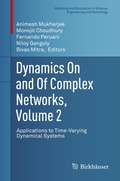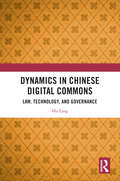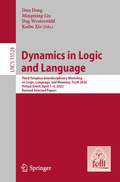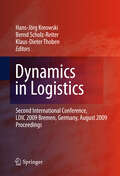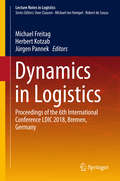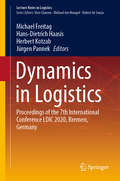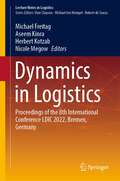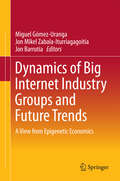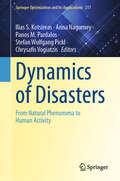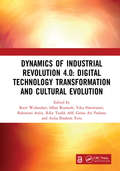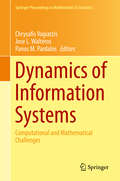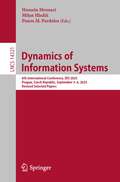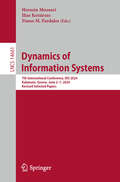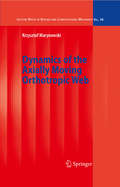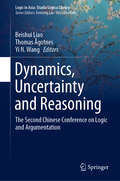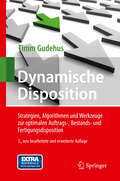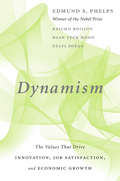- Table View
- List View
Dynamics 365 Business Central Development Quick Start Guide: Modern development techniques for Dynamics 365 Business Central
by Stefano Demiliani Duilio TacconiUnderstanding the new Microsoft Extension model for developmentKey FeaturesDevelop solutions for Dynamics 365 Business CentralOrient yourself with the new Microsoft Extension model for developmentLearn modern ways to develop with Dynamics 365 Business CentralBook DescriptionMicrosoft Dynamics 365 Business Central is the new SaaS ERP proposition from Microsoft. This latest version has many exciting features guaranteed to make your life easier. This book is an ideal guide to Dynamics 365 Business Central and will help you get started with implementing and designing solutions for real-world scenarios.This book will take you through the fundamental topics for implementing solutions based on Dynamics 365 Business Central (on-premise and SaaS). We'll see the core topics of the new development model (based on extensions) and we'll see how to create applications with the new Microsoft ERP proposition.The book begins by explaining the basics of Dynamics 365 Business Central and the Microsoft ERP proposition. We will then cover topics such as extensions, the new modern development model of Visual studio code, sandboxes, Docker, and many others. By the end of the book, you will have learned how to debug and compile extensions and to deploy them to the cloud and on-premise.You will also have learned how to create serverless business processes for Microsoft Dynamics 365 Business Central.What you will learnDevelop solutions for Dynamics 365 Business CentralCreate a sandbox for extensions development (local or on cloud)Use Docker with Dynamics 365 Business CentralCreate extensions for Dynamics 365 Business CentralHandle dependencies, translations and reportingDeploy extensions on-premise and to the cloudCreate serverless processes with Dynamics 365 Business CentralUnderstand source code management for ALWho this book is forThis book is for Microsoft Dynamics 365 Business Central solution developers and architects that needs to implement solutions based on the Microsoft's ERP (on-premise and SaaS).
Dynamics 365 CE Essentials: Administering and Configuring Solutions
by Sarah CritchleyDiscover how to set up core Dynamics 365 Customer Engagement functionality and learn how to build more customized processes on top of the standard capabilities. This book starts by showing you how to set up the Dynamics 365 Online system for sales, customer service, marketing, field service, and Outlook integration. In the second section, you’ll work through UI customizations, process automation and reporting in Dynamics 365 CE. Learn about the App Framework, how to create model-driven apps and how to get started with the Common Data Service for Apps. Leverage Microsoft Flow within Dynamics 365 CE to create loosely coupled business applications using automation from Microsoft and third-party services.After reading Dynamics 365 CE Essentials, you will have mastered the core functionality available in Dynamics 365 CE and be able to set it up for a number of different scenarios. What You Will LearnSet up the core standard features of Dynamics 365 CECreate model-driven apps within Dynamics 365 customized to specific business needsCustomize Dynamics 365 CE and leverage process automation functionality through the UILearn about the Common Data Service for Apps Who This Book Is For Consultants, business analysts, administrators, and project managers who are looking for more information about Dynamics 365.
Dynamics 365 Essentials: Getting Started with Dynamics 365 Apps in the Common Data Service
by Sarah CritchleyDiscover what the Common Data Service is and how Dynamics 365 fits in the Power Platform. Learn how to set up core Dynamics 365 Customer Engagement functionality and build more customized processes using model-driven apps. This book covers the Dynamics 365 Online system for sales, customer service, marketing, field service, and Outlook integration. In this second edition, core platform changes from the Common Data Service are included and you will know what this means for Dynamics 365. Updated features include processes, the latest form and view designer, and Business Process Flows. The book also includes new chapters on portals and power virtual agents.After reading Dynamics 365 Essentials, you will have mastered the core functionality available in Dynamics 365 CE and model-driven applications, and will be able to set it up for a range of different business scenarios.What You Will LearnSet up the core standard features of Dynamics 365 CECreate model-driven apps within Dynamics 365 customized to specific business needsCustomize Dynamics 365 CE and leverage process automation functionality through the UIStudy the Common Data Service for AppsWho This Book Is For Consultants, business analysts, administrators, and project managers who are looking for more information about Dynamics 365
Dynamics 365 Field Service: Implementing Business Solutions for the Enterprise
by Sanjaya Yapa Indika AbayarathneConfigure and customize Microsoft Dynamics 365 Field Services to help your organization deliver onsite service to customer locations. This book will guide you in setting up and implementing Dynamics 365 Field Services to automate workflow and schedule algorithms for mobile users.The book starts with an introduction to Field Services and setting up your Dynamics 365 subscription. Next, you will configure your application. You are shown how to allocate work, manage resources, and move inventory. You will configure both Field Services and the new Field Services Mobile app. One of the main topics covered is applying security to both Field Services and the Field Services Mobile App and how to use both flavors of the application to implement effective solutions. You will go through examples to understand and apply the concepts and features for configuration of Field Services. You also will learn best practices for configuring and customizing Field Services.After reading this book, you will be able to develop and implement enterprise-scale solutions using Dynamics 365 Field Services.What Will You LearnCreate and process Work OrdersManage inventory movement in the fieldSet up security in Field Services and Field Services Mobile AppGenerate Work Orders with agreementUtilize Microsoft Power Automate with Field ServiceWho Is This Book ForTechnical and functional consultants who have Dynamics 365 CE development experience
Dynamics 365 for Finance and Operations Development Cookbook - Fourth Edition
by Deepak Agarwal Abhimanyu SinghOver 80 effective recipes to help you solve real-world Microsoft Dynamics 365 for Finance and Operations development problems About This Book • Learn all about the enhanced functionalities of Dynamics 365 for Finance and Operations and master development best practices • Develop powerful projects using new tools and features • Work through easy-to-understand recipes with step-by-step instructions and useful screenshots Who This Book Is For If you are a Dynamics AX developer primarily focused on delivering time-proven applications, then this book is for you. This book is also ideal for people who want to raise their programming skills above the beginner level, and at the same time learn the functional aspects of Dynamics 365 for Finance and Operations. Some X++ coding experience is expected. What You Will Learn • Explore data manipulation concepts in Dynamics 365 for Operations • Build scripts to assist data migration processes • Organize data in Dynamics 365 for Operations forms • Make custom lookups using AOT forms and dynamically generate them from X++ code • Create a custom electronic payment format and process a vendor payment using it • Integrate your application with Microsoft Office Suite and other external systems using various approaches • Export and import business data for further distribution or analysis • Improve your development efficiency and performance In Detail Microsoft Dynamics 365 for Finance and Operations has a lot to offer developers. It allows them to customize and tailor their implementations to meet their organization's needs. This Development Cookbook will help you manage your company or customer ERP information and operations efficiently. We start off by exploring the concept of data manipulation in Dynamics 365 for Operations. This will also help you build scripts to assist data migration, and show you how to organize data in forms. You will learn how to create custom lookups using Application Object Tree forms and generate them dynamically. We will also show you how you can enhance your application by using advanced form controls, and integrate your system with other external systems. We will help you script and enhance your user interface using UI elements. This book will help you look at application development from a business process perspective, and develop enhanced ERP solutions by learning and implementing the best practices and techniques. Style and approach The book follows a practical recipe-based approach, focusing on real-world scenarios and giving you all the information you need to build a strong Dynamics 365 for Finance and Operations implementation.
Dynamics Of Mediatization
by Andreas Hepp Olivier Driessens Göran Bolin Stig HjarvardThis volume sheds light on the underlying dynamics of mediatization, disentangling the actual unfolding of mediatization processes. The wide adoption and deep embedding of digital media and technology brings new questions to mediatization studies: how can we grasp this 'deep mediatization'? In which way should we develop existing approaches of mediatization to analyse such dynamics? What are the consequences of this for theorising and empirically studying mediatization? By using these questions as a starting point, this book presents an innovative and original collection that is dedicated to both the underlying dynamics of mediatization and recent dynamics related to digital media.
Dynamics On and Of Complex Networks
by Animesh Mukherjee Andreas Deutsch Niloy GangulyThis self-contained book systematically explores the statistical dynamics on and of complex networks having relevance across a large number of scientific disciplines. The theories related to complex networks are increasingly being used by researchers for their usefulness in harnessing the most difficult problems of a particular discipline. The book is a collection of surveys and cutting-edge research contributions exploring the interdisciplinary relationship of dynamics on and of complex networks. Topics covered include complex networks found in nature--genetic pathways, ecological networks, linguistic systems, and social systems--as well as man-made systems such as the World Wide Web and peer-to-peer networks. The contributed chapters in this volume are intended to promote cross-fertilization in several research areas, and will be valuable to newcomers in the field, experienced researchers, practitioners, and graduate students interested in systems exhibiting an underlying complex network structure in disciplines such as computer science, biology, statistical physics, nonlinear dynamics, linguistics, and the social sciences.
Dynamics On and Of Complex Networks, Volume 2: Applications to Time-Varying Dynamical Systems
by Animesh Mukherjee Niloy Ganguly Bivas Mitra Fernando Peruani Monojit ChoudhuryThis self-contained book systematically explores the statistical dynamics on and of complex networks with a special focus on time-varying networks. In the constantly changing modern world, there is an urgent need to understand problems related to systems that dynamically evolve in either structure or function, or both. This work is an attempt to address such problems in the framework of complex networks. Dynamics on and of Complex Networks, Volume 2: Applications to Time-Varying Dynamical Systems is a collection of surveys and cutting-edge research contributions exploring key issues, challenges, and characteristics of dynamical networks that emerge in various complex systems. Toward this goal, the work is thematically organized into three main sections with the primary thrust on time-varying networks: Part I studies social dynamics; Part II focuses on community identification; and Part III illustrates diffusion processes. The contributed chapters in this volume are intended to promote cross-fertilization in several research areas and will be valuable to newcomers in the field, experienced researchers, practitioners, and graduate students interested in pursuing research in dynamical networks with applications to computer science, statistical physics, nonlinear dynamics, linguistics, and the social sciences. This volume follows Dynamics On and Of Complex Networks: Applications to Biology, Computer Science, and the Social Sciences (2009), ISBN 978-0-8176-4750-6.
Dynamics in Chinese Digital Commons: Law, Technology, and Governance
by Hu LingThe book provides an up-to-date, comprehensive, and critical explanation of digital commons in China.It aims to reshape the theoretical discussion of digital commons, stressing the significance of digital mode of production and power division structure between government and digital platforms—both characters shed light on how China has developed its digital economy and maintained a relatively innovative cyberspace during the past 20 years. This book could serve as a foundational analysis for future studies on China’s Internet.The book will appeal to scholars, entrepreneurs, and policymakers interested in digital commons, governance of cyberspace, and China's political economy.
Dynamics in Logic and Language: Third Tsinghua Interdisciplinary Workshop on Logic, Language, and Meaning, TLLM 2022, Virtual Event, April 1–4, 2022, Revised Selected Papers (Lecture Notes in Computer Science #13524)
by Mingming Liu Dun Deng Dag Westerståhl Kaibo XieEdited in collaboration with FoLLI, the Association of Logic, Language and Information, this book constitutes the refereed proceedings of the Third Tsinghua Interdisciplinary Workshop on Logic, Language, and Meaning, TLLM 2022, which was held virtually in April 2022.The 9 full papers presented in this volume were carefully reviewed and selected from 13 submissions. The workshop covers a wide range of topics such as dynamic semantics, logical dynamics, Dynamic Epistemic Logic, Discourse Representation Theory, formal semantics, free choice inference, update semantics, and donkey sentences.
Dynamics in Logistics
by Bernd Scholz-Reiter Hans-Jörg Kreowski Klaus-Dieter ThobenThe volume comprises the proceedings of the third International Conference on Dynamics in Logistics LDIC 2012. The scope of the conference targeted the identification, analysis, and description of the dynamics of logistic processes and networks. The spectrum ranged from the modeling and planning of processes and innovative methods like autonomous control and knowledge management to the new technologies provided by radio frequency identification, mobile communication, and networking. The growing dynamics in the area of logistics poses completely new challenges: Logistic processes and networks must rapidly and flexibly adapt to continuously changing conditions. LDIC 2012 provided a venue for researchers from academia and industry interested in the technical advances in dynamics in logistics. The conference addressed research in logistics from a wide range of fields, e.g. engineering, computer science and operations research. The volume consists of two invited papers and of 49 contributed papers divided into various subjects including transport logistics, routing in dynamic logistic networks, modeling, simulation, optimization and collaboration in logistics, identification technologies, mathematical modeling in transport and production logistics, information, communication, risk and failure in logistic systems, autonomous control in logistic processes, global supply chains and industrial applications, and the Internet of Things in the context of logistics.
Dynamics in Logistics
by Jürgen Pannek Herbert Kotzab Michael FreitagThese proceedings contain research presented at the 6th International Conference on Dynamics in Logistics, held in February 2018.The integration of dynamics within the modeling, planning and control of logistic processes and networks has shown to contribute massively to the improvement of the latter. Moreover, diversification of markets and demand has increased both the complexity and the dynamic changes of problems within the area of logistics. To cope with these challenges, it must become possible to identify, describe and analyze such process changes. Moreover, logistic processes and networks must be revised to be rapidly and flexibly adaptable to continuously changing conditions. This book presents new ideas to solve such problems, offering technological, algorithmic and conceptual improvements. It primarily addresses researchers and practitioners in the field of industrial engineering and logistics.
Dynamics in Logistics: Proceedings of the 7th International Conference LDIC 2020, Bremen, Germany (Lecture Notes in Logistics)
by Jürgen Pannek Herbert Kotzab Michael Freitag Hans-Dietrich HaasisSince 2007, the biennial International Conferences on Dynamics in Logistics (LDIC) offers researchers and practitioners from logistics, operations research, production, industrial and electrical engineering as well as from computer science an opportunity to meet and to discuss the latest developments in this particular research domain. From February 12th to 14th 2020 for the seventh time, LDIC 2020 is held in Bremen, Germany. Similar to its six predecessors, the Bremen Research Cluster for Dynamics in Logistics (LogDynamics) organizes this conference. The spectrum of topics reaches from the dynamic modeling, planning and control of processes over supply chain management and maritime logistics to innovative technologies and robotic applications for cyber-physical production and logistics systems. LDIC 2020 provides a forum for the discussion of advances in that matter. The conference program consists of three invited keynote speeches and 51 papers selected by a severe double-blind reviewing process. Within these proceedings all the papers are published. By this, the proceedings give an interdisciplinary outline on the state of the art of dynamics in logistics as well as identify challenges and solutions for logistics today and tomorrow.
Dynamics in Logistics: Proceedings of the 8th International Conference LDIC 2022, Bremen, Germany (Lecture Notes in Logistics)
by Herbert Kotzab Michael Freitag Nicole Megow Aseem KinraSince 2007, the biennial International Conferences on Dynamics in Logistics (LDIC) offers researchersand practitioners from logistics, operations research, production, industrial and electrical engineering aswell as from computer science an opportunity to meet and to discuss the latest developments in thisparticular research domain. From February 23th to 25th 2022 for the eighth time, LDIC 2022 was held inBremen, Germany. Similar to its seven predecessors, the Bremen Research Cluster for Dynamics inLogistics (LogDynamics) organized this conference. The spectrum of topics reaches from the dynamicmodeling, planning and control of processes over supply chain management and maritime logistics toinnovative technologies and robotic applications for cyber-physical production and logistics systems.LDIC 2022 provided a forum for the discussion of advances in that matter. The conference programconsisted of keynote speeches and research papers selected by a severe double-blind reviewing process.Within these proceedings all the papers are published. By this, the proceedings give an interdisciplinaryoutline on the state of the art of dynamics in logistics as well as identify challenges and solutions forlogistics today and tomorrow.
Dynamics in Microwave Chemistry
by Kama Huang Xiaoqing Yang Huacheng ZhuThis book addresses microwave chemistry at both the physical and molecular level. Its main goal is to elaborate the highly complex scientific issues involved in the fundamental theory of microwave chemistry, and in industrialized applications in the near future.The book provides detailed insights into the characterization and measurement of dielectric properties under complex conditions, such as chemical reactions, high-temperature environments, etc. Considerable attention is paid to the theory of dynamics in microwave chemistry, from the view of both physical level and molecular level. Microwave-Material Interactions simulation is used for physical dynamical analysis, while a Microwave-Molecules Interactions methodology is proposed for molecular dynamical analysis. In turn, calculational examples are introduced for better description and validation, respectively. Lastly, the book proposes design strategies and calculational examples for large-scale application.Richly illustrated and including a wealth of worked-out examples, this book is ideal for all researchers, students and engineers who are just getting started in the dynamics of microwave chemistry.
Dynamics of Big Internet Industry Groups and Future Trends
by Miguel Gómez-Uranga Jon Mikel Zabala-Iturriagagoitia Jon BarrutiaThis book applies a new analytical framework to the study of the evolution of large Internet companies such as Apple, Google, Microsoft, Facebook, Amazon and Samsung. It sheds light on the dynamics of business groups, which are approached as 'business ecosystems,' and introduces the concept of Epigenetic Economic Dynamics (EED), which is defined as the study of the epigenetic dynamics generated as a result of the adaptation of organizations to major changes in their respective environments. The book augments the existing literature on evolutionary economic thinking with findings from epigenetics, which are proving increasingly useful in analyzing the workings of large organizations. It also details the theoretical and conceptual nature of recent work based on evolutionary economics, mainly from the perspective of generalized Darwinism, resilience and related variety, and complements the work conducted on evolutionary economics by applying the analytical framework of EED. It makes it easier to forecast future dynamics on the Internet by proving that a sizable number of big business groups are veering from their initial paths to take unprecedented new directions as a result of competition pressure, and as such is a valuable resource for postgraduates and researchers as well as those involved in economics and innovation studies.
Dynamics of Disasters: From Natural Phenomena to Human Activity (Springer Optimization and Its Applications #217)
by Panos M. Pardalos Ilias S. Kotsireas Anna Nagurney Chrysafis Vogiatzis Stefan Wolfgang PicklBased on the “Sixth International Conference on Dynamics of Disasters” (Piraeus, Greece, July 2023), this volume includes contributions from experts who share their latest discoveries on disasters either caused by natural phenomena or human activities. Authors provide overviews of the tactical points involved in disaster relief, outlines of hurdles from mitigation and preparedness to response and recovery and uses for mathematical models to describe disasters and their impacts. This volume includes additional invited manuscripts from other experts and leaders in the field. Topics covered include economics, optimization, machine learning, government, management, business, humanities, engineering, medicine, mathematics, computer science, behavioral studies, emergency services, and environmental studies and will engage readers from a wide variety of fields and backgrounds.
Dynamics of Industrial Revolution 4.0: Proceedings of the 7th Bandung Creative Movement International Conference on Creative Industries (7th BCM 2020), Bandung, Indonesia, 12th November 2020
by Ratri WulandariThe 7th Bandung Creative Movement conference presented the theme "Dynamics of Industrial Revolution 4.0" which discussed how the digital world and connectivity changed human culture in various aspects of life, and transformed in accordance to human needs and social culture. Digital technology has transformed society to serve people from manufacturing needs to smart cities, from network connectivity to people connectivity. The application of information technology has helped in improving live quality and environmental sustainability. Digital transformation is revolutionizing how businesses and workers interconnect to be more productive and efficient. The result is improved collaboration, faster processes and time-to-market, lower costs and better products. Devices are getting smarter, meaning they are able to perform more and more tasks without human intervention; moreover, these devices generate data that provide insights to further improve processes and gain greater efficiencies. Moreover, with the Internet of Things (IoT), all these smart devices are interconnected in ways that not only help make them even smarter, but also enhances the intelligence of the overall system. Digital technology is a formidable driver for the transformation of a highly carbon-dependent world into one that is more ecologically ‘smart.’ We are entering a new era of environmental innovation that is driving better alignment between technology and environmental goals. Since its first announcement in 2011, industrial revolution 4.0 has dynamically changed and transformed to adjust itself to the human needs and to serve more efficiency and effectiveness of everyday life as well as environmental enhancement. The 7th Bandung Creative Movement has brought forward discussions on dynamic changes, ups and downs, innovations, relations of industrial revolution of the internet of thing, data, automation, to human physical world, new art and aesthetic, business, product innovation, built environment, and education.
Dynamics of Information Systems
by Panos M. Pardalos Chrysafis Vogiatzis Jose L. WalterosThe contributions of this volume stem from the "Fifth International Conference on the Dynamics of Information Systems" held in Gainesville, FL in February 2013, and discuss state-of the-art techniques in handling problems and solutions in the broad field of information systems. Dynamics of Information Systems: Computational and Mathematical Challenges presents diverse aspects of modern information systems with an emphasis on interconnected network systems and related topics, such as signal and message reconstruction, network connectivity, stochastic network analysis, cyber and computer security, community and cohesive structures in complex networks. Information systems are a vital part of modern societies. They are essential to our daily actions, including social networking, business and bank transactions, as well as sensor communications. The rapid increase in these capabilities has enabled us with more powerful systems, readily available to sense, control, disperse, and analyze information.
Dynamics of Information Systems: 6th International Conference, DIS 2023, Prague, Czech Republic, September 3–6, 2023, Revised Selected Papers (Lecture Notes in Computer Science #14321)
by Panos M. Pardalos Hossein Moosaei Milan HladíkThis book constitutes the proceedings of the 6th International Conference on Dynamics of Information Systems, DIS 2023, which took place in Prague, Czech Republic, in September 2023. The 18 full papers included in the book were carefully reviewed and selected from 43 submissions. They deal with topics ranging from theoretical, algorithmic, and practical perspectives in information systems, to offering readers valuable information, theories and techniques.
Dynamics of Information Systems: 7th International Conference, DIS 2024, Kalamata, Greece, June 2–7, 2024, Revised Selected Papers (Lecture Notes in Computer Science #14661)
by Panos M. Pardalos Ilias Kotsireas Hossein MoosaeiThis post conference LNCS volume constitutes the proceedings of the 7th International Conference on Dynamics of Information Systems, DIS 2024, in Kalamata, Greece, took place in June 2024. The 19 full papers together included in this volume were carefully reviewed and selected from 40 submissions. The conference presents topics such as information systems, optimization, operations research, machine learning, and artificial intelligence.
Dynamics of the Axially Moving Orthotropic Web
by Krzysztof MarynowskiA material continuum moving axially at high speed can be met in numerous different technical applications. These comprise band saws, web papers during manufacturing, processing and printing processes, textile bands during manufacturing and processing, pipes transporting fluids, transmission belts as well as flat objects moving at high speeds in space. In all these so varied technical applications, the maximum transport speed or the transportation speed is aimed at in order to increase efficiency and optimize investment and performance costs of sometimes very expensive and complex machines and installations. The dynamic behavior of axially moving systems very often hinders from reaching these aims. The book is devoted to dynamics of axially moving material objects of low flexural stiffness that are referred to as webs. Webs are moving at high speed, for example, in paper production the paper webs are transported with longitudinal speeds of up to 3000 m/min. Above the critical speed one can expect various dynamical instabilities mainly of divergent and flutter type. The up-to-date state of investigations conducted in the field of the axially moving system dynamics is presented in the beginning of the book. Special attention is paid on nonlinear dynamic investigations of translating systems. In the next chapters various mathematical models that can be employed in dynamic investigations of such objects and the results of analysis of the dynamic behavior of the axially moving orthotropic material web are presented. To make tracing the dynamic considerations easier, a paper web is the main object of investigations in the book.
Dynamics, Uncertainty and Reasoning: The Second Chinese Conference on Logic and Argumentation (Logic in Asia: Studia Logica Library)
by Beishui Liao Thomas Ågotnes Yi N. WangThis volume collects selected papers presented at the Second Chinese Conference on Logic and Argumentation in 2018 held in Hangzhou, China. The papers presented reflect recent advances in logic and argumentation, as well as the connections between the two, and also include invited papers contributed by leading experts in these fields. The book covers a wide variety of topics related to dynamics, uncertainty and reasoning. It continues discussions on the interplay between logic and argumentation which has a long history from Aristotle’s ancient logic to very recent formal argumentation in AI.
Dynamische Disposition
by Timm GudehusDie dynamische Disposition ermöglicht marktgerechte Lieferzeiten und kostenoptimale Lieferfähigkeit, sie verhindert überhöhte oder unzureichende Bestände. In dem Buch werden Strategien, Algorithmen und Verfahren der dynamischen Auftrags-, Bestands- und Fertigungsdisposition allgemein verständlich beschrieben und anhand von Beispielen demonstriert. Mithilfe des Regelwerks kann die dynamische Disposition in allen Branchen organisiert und implementiert werden. Die erweiterte 3. Auflage zeigt Potenziale für Serviceverbesserung und Kosteneinsparung auf.
Dynamism: The Values That Drive Innovation, Job Satisfaction, and Economic Growth
by Edmund S. Phelps Gylfi Zoega Raicho Bojilov Hian Teck HoonNobel Laureate Edmund Phelps and an international group of economists argue that economic health depends on the widespread presence of certain values, in particular individualism and self-expression. Nobel Laureate Edmund Phelps has long argued that the high level of innovation in the lead nations of the West was never a result of scientific discoveries plus entrepreneurship, as Schumpeter thought. Rather, modern values—particularly the individualism, vitalism, and self-expression prevailing among the people—fueled the dynamism needed for widespread, indigenous innovation. Yet finding links between nations’ values and their dynamism was a daunting task. Now, in Dynamism, Phelps and a trio of coauthors take it on. Phelps, Raicho Bojilov, Hian Teck Hoon, and Gylfi Zoega find evidence that differences in nations’ values matter—and quite a lot. It is no accident that the most innovative countries in the West were rich in values fueling dynamism. Nor is it an accident that economic dynamism in the United States, Britain, and France has suffered as state-centered and communitarian values have moved to the fore. The authors lay out their argument in three parts. In the first two, they extract from productivity data time series on indigenous innovation, then test the thesis on the link between values and innovation to find which values are positively and which are negatively linked. In the third part, they consider the effects of robots on innovation and wages, arguing that, even though many workers may be replaced rather than helped by robots, the long-term effects may be better than we have feared. Itself a significant display of creativity and innovation, Dynamism will stand as a key statement of the cultural preconditions for a healthy society and rewarding work.
